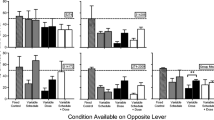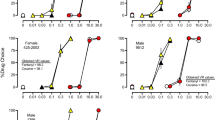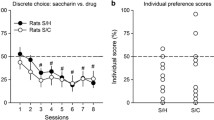Abstract
Several theoretical models of choice, including matching, maximizing and probability matching, have evolved from the experimental analysis of behavior. However, these models are based largely on results of studies involving non-drug reinforcers. The extent to which the choice to self-administer a drug of abuse conforms to these models is largely unknown. The present study was designed to examine the effects of varying probability of reinforcement of two options on choice by rhesus monkeys maintained under a discrete-trials choice procedure. One group of monkeys (n=5) was prepared with chronic indwelling venous catheters and responding was maintained by IV injections of cocaine (0.05 or 0.2 mg/kg per injection). In a second group, behavioral conditions were identical, except that responding was maintained by the delivery of food pellets. Two choice options were available to each group. Each option was maintained by the identical dose of cocaine or amount of food, but with varying probabilities of delivery. The percentage of trials on which monkeys chose option 1 increased with its probability of reinforcement for cocaine (0.05 or 0.2 mg/kg per injection) and this effect did not change with dose of cocaine. When probabilities of reinforcement for option 1/option 2 were 0.75/0.25, choice was exclusive for the higher probability option. Results were identical when behavior was maintained by food. The present experiment supports the conclusion that exclusive choice of the alternative with the higher probability of reinforcement can be extended to cocaine as a reinforcer. The present results also extend the known conditions under which drug-maintained responding is similar to food-maintained responding to situations involving options with different probabilities of reinforcement, i.e., probability choice. Probability matching was not observed, arguing that this model does not predict drug or food choice.
Similar content being viewed by others
Author information
Authors and Affiliations
Additional information
Received: 24 October 1997 / Final version: 29 January 1998
Rights and permissions
About this article
Cite this article
Woolverton, W., Rowlett, J. Choice maintained by cocaine or food in monkeys: effects of varying probability of reinforcement. Psychopharmacology 138, 102–106 (1998). https://doi.org/10.1007/s002130050651
Issue Date:
DOI: https://doi.org/10.1007/s002130050651




